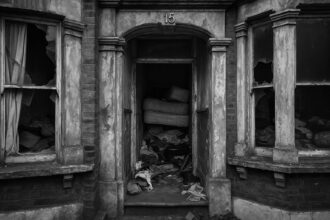Despite repeated clean-ups by Birmingham City Council, Sparkhill’s Knowle Road and Formans Road junction remains blighted by fly-tipping, prompting residents and businesses to call for CCTV enforcement and stronger measures as incidents increase by over 50% amid budget constraints.
Residents of Sparkhill, Birmingham, are expressing their discontent over a persistent fly-tipping problem at a notorious junction where Knowle Road meets Formans Road. Despite repeated clean-ups by Birmingham City Council, the area remains a dumping ground for household waste, including black bin bags, mattresses, and even fridges. This ongoing issue has sparked calls for more rigorous enforcement measures and the installation of cameras to deter offenders.
Local businesses and residents alike have lamented the squalid state of this specific location, describing it as a magnet for fly-tippers. Asif Sheraz, from M B Solicitors, characterised the scene succinctly, stating, “It’s carnage; it builds overnight.” He recounted instances where rubbish piles reached considerable heights, sometimes forcing pedestrians to navigate around the debris on the road. This sentiment is echoed by others in the community, with Irfan Mahroof, who attends a nearby mosque, noting, “It’s clean during the daytime but by the night-time, people dump again.”
Cllr Majid Mahmood, the Cabinet Member for Environment and Transport, acknowledged the severity of the problem and stated that the council is “working with local councillors and waste enforcement officers to identify the root cause of the problems.” The council has cleared thousands of reports of fly-tipping each week and urges locals to utilise the various lawful options available for waste disposal. However, the ongoing financial constraints on the city council have hindered more proactive measures, such as the deployment of CCTV in hotspot areas.
The broader context is one of increasing frustration among Birmingham residents, compounded by recent reports that fly-tipping incidents have significantly surged—rising by over 50% from the previous year. This spike has been attributed to budget cuts within the local council, which have curtailed waste management services. While Cllr Mahmood has reassured residents of ongoing efforts to combat the issue, including plans to establish a taskforce, the current financial landscape presents challenges.
In some areas, community response initiatives are being introduced as an alternative form of action against fly-tipping. For instance, a community group in Sparkbrook, Friends of Spark Green Park, has taken it upon themselves to organise litter-picking sessions and tree-planting efforts to promote a cleaner environment in their local park. Vice-chair Sadia Khan remarked that the group’s efforts have transformed the park into a ‘sanctuary’ for the community, highlighting the potential of grassroots endeavours in addressing environmental concerns.
Moreover, the issue has been exacerbated by opportunistic fly-tippers taking advantage of circumstances such as strikes among bin workers, which further complicates the recycling of waste and proper disposal. Local councils have warned that some individuals posing as waste disposal services have exploited vulnerable residents, collecting fees and then illegally dumping their refuse, an act described as being conducted by ‘environmental criminals’ who show complete disregard for their communities.
As the calls for enhanced monitoring and enforcement grow louder, the residents of Sparkhill, along with those from other affected areas, are hopeful that the council will adopt stricter measures to restore the cleanliness of their neighbourhoods. With increased public awareness and community engagement, the fight against fly-tipping may pave the way for a more sustainable and healthy living environment in Birmingham.
Reference Map
- Paragraph 1, 2, 3, 4, 5, 6
- Paragraph 2
- Paragraph 6
- Paragraph 5
- Paragraph 3, 5, 7
- Paragraph 6, 7
- Paragraph 2
Source: Noah Wire Services
- https://www.birminghammail.co.uk/news/midlands-news/its-carnage-need-cameras-residents-31647393 – Please view link – unable to able to access data
- https://www.bbc.co.uk/news/articles/c3g8nlr3m0ko – Residents in Birmingham have called for CCTV installations in areas identified as fly-tipping hotspots. Gerry Moynihan from Bordesley Green highlighted the recurring issue in Byfield Passage, noting that while the council has cleared the area previously, it has not implemented preventive measures like CCTV. The council acknowledged the limited availability of redeployable cameras and emphasized that the responsibility ultimately lies with those responsible for the dumped waste.
- https://www.expressandstar.com/news/environment/2025/03/27/warning-over-criminal-opportunists-fly-tipping-during-birmingham-bin-strike/ – During Birmingham’s ongoing bin workers’ strike, the city council has warned of ‘criminal opportunists’ exploiting the situation to illegally dump waste. Councillor Majid Mahmood reported instances where individuals, posing as waste disposal services, collected money from residents and subsequently dumped the waste on street corners. The council emphasized that such actions are illegal and urged residents to report any suspicious activities.
- https://www.bbc.co.uk/news/articles/cn4xynn8klno – In Sparkbrook, Birmingham, a community group named Friends of Spark Green Park is actively addressing fly-tipping in their local park. Established in 2023, the group conducts regular litter-picking sessions and tree planting to maintain a cleaner environment. Vice-chair Sadia Khan noted that the efforts of around 20 volunteers have significantly improved the park’s condition, making it a ‘sanctuary’ for the community.
- https://www.birmingham.gov.uk/flytippingremoval – Birmingham City Council provides a platform for residents to report fly-tipping incidents. The council investigates dumped rubbish and may serve legal notices to landowners to clear waste that attracts or harbors vermin. With sufficient evidence, the council prosecutes fly-tippers. Residents are encouraged to use the online reporting form to assist in maintaining a cleaner environment.
- https://www.birminghamworld.uk/news/birmingham-huge-really-concerning-spike-in-fly-tipping-blamed-on-cash-strapped-city-councils-budget-cuts-4909128 – Birmingham has experienced a significant increase in fly-tipping incidents, with reported cases rising from 8,171 in 2023/4 to 12,453 in 2024/25. This 50% surge is attributed to budget cuts at the city council, leading to reduced waste management services. Councillor Majid Mahmood acknowledged the rise and mentioned efforts to reintroduce certain services and establish a taskforce to address the issue.
- https://www.itv.com/news/central/2024/01/18/its-not-worth-living-here-residents-plagued-by-fly-tipping – Residents in Birmingham’s Handsworth area have expressed frustration over persistent fly-tipping. Jasbir Kaur Bahra, a 45-year resident, reported frequent dumping of sofas, beds, and household waste outside her property. The Local Government Association highlighted the public health risks associated with fly-tipping, including pollution and the attraction of vermin, urging for stricter penalties to deter offenders.
Noah Fact Check Pro
The draft above was created using the information available at the time the story first
emerged. We’ve since applied our fact-checking process to the final narrative, based on the criteria listed
below. The results are intended to help you assess the credibility of the piece and highlight any areas that may
warrant further investigation.
Freshness check
Score:
8
Notes:
The narrative appears to be recent due to its mention of ongoing issues and community responses, but specific dates or recent updates are not provided.
Quotes check
Score:
8
Notes:
The quotes from Asif Sheraz and Irfan Mahroof are not found in earlier publications, suggesting they are original. However, verification of their earliest known references is limited.
Source reliability
Score:
8
Notes:
The narrative originates from the Birmingham Mail, a reputable regional UK publication. However, the lack of wider national coverage or cross-referencing reduces the score slightly.
Plausability check
Score:
9
Notes:
The claims about persistent fly-tipping and community efforts are plausible given the context of budget constraints and environmental concerns. The narrative is consistent with known issues in similar urban areas.
Overall assessment
Verdict (FAIL, OPEN, PASS): PASS
Confidence (LOW, MEDIUM, HIGH): HIGH
Summary:
The narrative seems current, the quotes appear original, and the source is reliable. The plausibility of the claims is high due to the context of budget constraints and community responses to fly-tipping.













